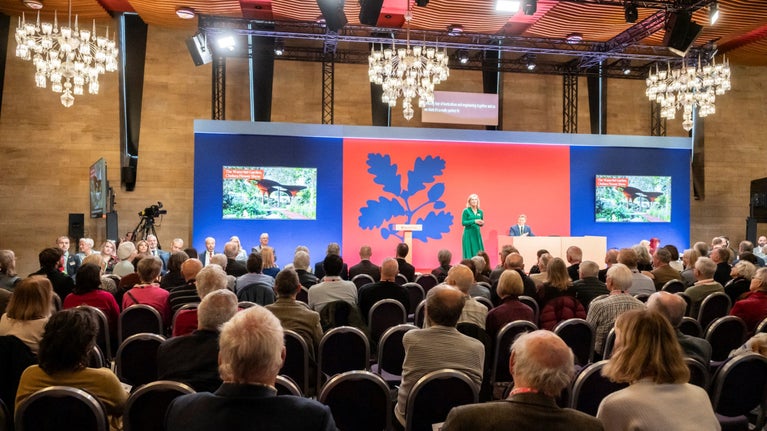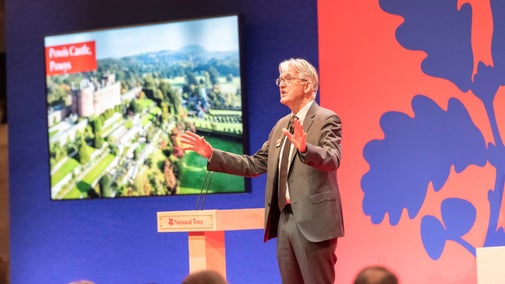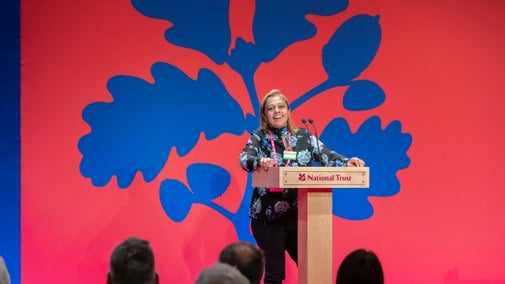
Annual General Meeting
The 2024 Annual General Meeting took place on 2 November online and in Newcastle upon Tyne. Find out the voting results, including the outcomes on the resolutions and elections.

Read the minutes from the 129th Annual General Meeting, held at the Civic Centre, Newcastle upon Tyne and online on Saturday 2 November 2024.
René Olivieri, the Chair, welcomed members, both online and in person at the Civic Centre Newcastle upon Tyne, to the National Trust’s (the ‘Trust’s’) 129th Annual General Meeting.
The Chair opened the meeting by reflecting on a recent visit to Runnymede where, 800 years before, Magna Carta had been sealed, and then also the Forest Charter. The location brought together history, nature, and now also local communities through the exciting ‘Runnymede Explored’ offer to visitors.
The location also showcased the responsibilities upon the Trust to preserve nature for the nation; nowhere was more symbolic than the 2,500 Ankerwycke Yew which still stood with the Trust’s support. The Chair described the way that the illegal felling in 2023 of the Sycamore Gap tree, another precious Trust tree, had generated an outpouring of emotion. The level of connection people had with nature was one which would be essential to ensure future generations continued to care for the natural environment.
Looking back at last year’s AGM, the Chair recalled interest from members in how the Trust was engaging with young people, and he shared examples of how the charity was building important connections with young people as future custodians of natural and built heritage.
Members heard about the work to bring nature to urban settings and how the Trust was working in partnership with others to deliver this and inspire access to nature beyond its own borders. At Trust places, following the support shown for the previous year’s Members’ Resolution on walking and cycling access, the Trust was improving opportunities for green travel to its places, again working with other charities and partners.
The Chair spoke of the importance of also continuing to invest in Trust properties and the member experience, highlighting the development of 28 Discovery Houses as must-visit cultural destinations. National Trust volunteers were commended for their significant contribution to delivering important conservation work and memorable visitor experiences across the Trust’s estate.
The Chair reviewed the work the Board had undertaken over the past 12 months, particularly developing the forthcoming Ten-Year Strategy for 2025-35. An external board evaluation had also been undertaken and confirmed the Board of Trustees was in good health and working effectively to deliver the Trust’s charitable purposes. The Chair concluded by welcoming members’ contributions throughout the meeting.
Hilary McGrady, Director-General, began by thanking members for their ongoing support, which had allowed the Trust to achieve significant conservation milestones over the last 12 months. Despite significant pressures on the charity’s finances, there were many positives to celebrate: visitor numbers were rising, volunteering was growing, and interest and support for the Trust’s work was strong.
A personal highlight for the Director-General had included visiting Portstewart Strand in Northern Ireland, where accessibility to the Strand had been enhanced by new facilities to welcome visitors with additional needs. Developing every Trust location to be as accessible as possible was a priority for the Trust.
In the last 10-year strategy period, the Trust had delivered significant projects which had included restoration of the interior at Seaton Delaval Hall, restoring landscapes like Prior Park and, more recently, opening a new Mediterranean garden at Beningbrough Hall that would be resilient to future climate challenges.
Other defining projects included the opening of the Royal Oak Conservation Studio at Knole, which had, alongside day-to-day restoration work, allowed the Trust to bring back to life a Claude Monet painting of the River Thames gifted to Sir Winston Churchill. Around 300 new historical items had come into Trust care through acquisitions at Chirk Castle – including invaluable artefacts dating back to the English Civil War.
During the 10 years, the Trust had delivered on its ambitious nature conservation target to restore 25,000 hectares of priority habitat, restored land above the White Cliffs of Dover and was seeing the benefit of its Riverlands project to restore waterways for nature and to reduce flooding. The Director-General celebrated that the Trust was also reaching new audiences through its work in urban settings, and was expanding the range of stories that it told, including working-class history, LGBTQ+ and ethnically diverse histories. These stories were part of the UK’s collective and rich history. Trust places were also now offering unique experiences for visitors and greater opportunities for children to engage.
The Director-General thanked the fantastic volunteers of the National Trust, and spoke of the outstanding contribution of Malcolm Walford, a volunteer of 71 years at Croome. Tribute was paid to former volunteers on the National Trust’s Council and Board of Trustees, who had passed in the last 12 months.
In her closing remarks, the Director-General said the Trust’s next 10-year strategy would have ambitious plans to restore nature, end unequal access to nature and heritage, work with people and communities beyond Trust places, and inspire the nation to care for nature, beauty and history.
Dabinder Hutchinson, Director of Finance, presented the Trust’s Annual Report and Financial Statements.
In summary, 2023–24 had been a successful year for the Trust but one in which it had faced financial challenges. Inflation had remained at a higher level than experienced in many years, and the Trust’s cost base had risen. The costs of living had impacted on families, and more visitors were likely to pay on the day to enjoy a Trust place.
However, the charity had experienced another record year of fundraising at £117.9m and this, combined with strong visitor numbers, meant the Trust had been able to invest more than ever on conservation, spending £184m on projects at properties. Despite a challenging economic backdrop, the Trust had also been able to invest 7.5% in a staff pay award.
The resolution to approve the minutes of the Annual General Meeting held in Swindon on Saturday 11 November 2023 was proposed by Jan Lasik, General Counsel & Secretary, on behalf of the Chair, and seconded by Sandy Nairne, Deputy Chair.
The resolution was voted on by ballot.
The resolution to adopt the Annual Report and Financial Statements for 2023–24 was proposed by Jan Lasik, General Counsel & Secretary, on behalf of the Chair, and seconded by Sandy Nairne, Deputy Chair.
The resolution was voted on by ballot.
The resolution to reappoint KPMG LLP as external auditor to the National Trust until the next Annual General Meeting was proposed by Jan Lasik, General Counsel & Secretary, on behalf of the Chair, and seconded by Sandy Nairne, Deputy Chair.
The resolution was voted on by ballot.
The resolution was proposed by Linda Newbery who spoke in favour of introducing a minimum of 50% plant-based meal choices across Trust menus. The resolution aimed to enhance the choices available to all visitors and to support environmental action such as reducing carbon emissions and nature loss caused by rearing livestock for meat production. The resolution was seconded by Robert Gordon.
Denise Jagger, Trustee, thanked the proposers and responded on behalf of the Board of Trustees, giving the Board’s support to the resolution. The resolution aligned with the Trust’s existing plans to expand menu choices, in response to visitor feedback. The Trustee reflected on the importance of catering for regional tastes, and the Board supported a move to a 50% plant-based offer nationally, that would flex according to demand at location. The Trust would continue to work with farmers whose practices benefited nature and climate. It was confirmed that meat, dairy and eggs would remain on the menu. The Trust also prioritised local and seasonable produce to support sustainability.
Following a discussion during which some members shared their thoughts, the resolution was voted on by ballot.
The resolution was proposed by Andrew James who spoke in favour of strengthening the Trust’s actions to address climate challenges. With extreme weather and food shortages anticipated, the proposer encouraged the Trust to campaign and undertake political activity in pursuit of its charitable objectives and climate action. The proposer considered that the Trust’s bank, Barclays, contributed to the climate crisis, and encouraged the Trust to bank elsewhere in the spirit of restoring nature. The resolution was seconded by Anne Blair-Vincent.
Lisbet Rausing, Trustee, thanked the proposers and responded on behalf of the Board of Trustees, giving the Board’s support to the resolution, and recognising that climate change threatened everything the Trust looked after, from its historic buildings and collections to land and wildlife. The support of members was welcomed in facing this significant challenge.
Following a discussion during which some members shared their thoughts, the resolution was voted on by ballot.
The resolution was proposed by Dr Jamie Russell who encouraged the Trust to support the cross-party Climate and Nature Bill that was before Parliament. The legislation sought to ensure the UK’s internally agreed pledges on climate and nature were made legally binding, and it was supported by many other organisations with an environmental cause. The Trust’s support would amplify the campaign and help protect the nation’s future. The resolution was seconded by Dougald Purce.
Patrick Figgis, Trustee, thanked the proposers and responded on behalf of the Board of Trustees, giving the Board’s support to the spirit of the resolution. The Trust supported strengthening climate targets and accelerating action to restore nature, while looking for a stronger and more comprehensive legislative framework that improved upon previous versions of the Bill.
Following a discussion during which some members shared their thoughts, the resolution was voted on by ballot.
Min Grimshaw, Member of the Council, presented the Council’s Annual Report, explaining the vital role of the Council in running the Nominations Committee process and outlining the role of both elected and appointed members of the Council.
The Council member reported that the development of the Trust’s new Ten-Year Strategy had been a dominant feature of the Council discussions, and the feedback from the strategy consultation had found that public trust in the charity was strong. There was a desire shared by the public and stakeholders for the Trust to engage with wider and more diverse communities and deliver public benefit beyond its own places.
In the summer of 2024, the Council had visited Trust places in North Wales, which had each demonstrated how staff and volunteers had felt empowered to deliver at a local level, and the theme of partnership working had also been a consistent message. As part of that visit, the formal Council meeting had undertaken a deep dive into climate, conservation and volunteering. From these discussions, the Council was confident that the Board of Trustees understood and was responding to the challenges the Trust faced, and the Council supported the Board’s strong ambitions. Finally, the Council had reviewed the external evaluation of the Trust Board, which had demonstrated it was operating effectively.
Ms Grimshaw concluded by thanking all the candidates who had stood for election in 2024, and those that were leaving the Council after years of service.
Jan Lasik, General Counsel & Secretary, announced the results of the ballot for election of individuals to the Council and thanked all those who had stood.
Andrew Poad (General Manager, Hadrian’s Wall) and Charlotte Smith (Host) discussed the public outpouring of emotion that had followed the illegal felling of the Sycamore Gap tree in 2023, and the action taken by the Trust to safeguard the remaining tree stump, allowing shoots to grow. Seeds had also been collected from the tree, and from this the Tree of Hope project had flourished, with cultivation of 49 saplings which would be offered to community groups.
The results of voting on agenda items and member resolutions taken earlier in the meeting were announced.
René Olivieri, the Chair, thanked members for joining the meeting in person and online and formally closed the 2024 Annual General Meeting.

The 2024 Annual General Meeting took place on 2 November online and in Newcastle upon Tyne. Find out the voting results, including the outcomes on the resolutions and elections.

The 2024 Annual General Meeting (AGM) took place on 2 November 2024 in Newcastle upon Tyne. Find out the voting results, including outcomes on the resolutions and elections.

The National Trust’s Board of Trustees reflected on all the resolutions at the 2024 AGM and shared their response to each.

The Annual General Meeting is convened in accordance with The Charities (National Trust) Order 2005. Find out more about what this means.